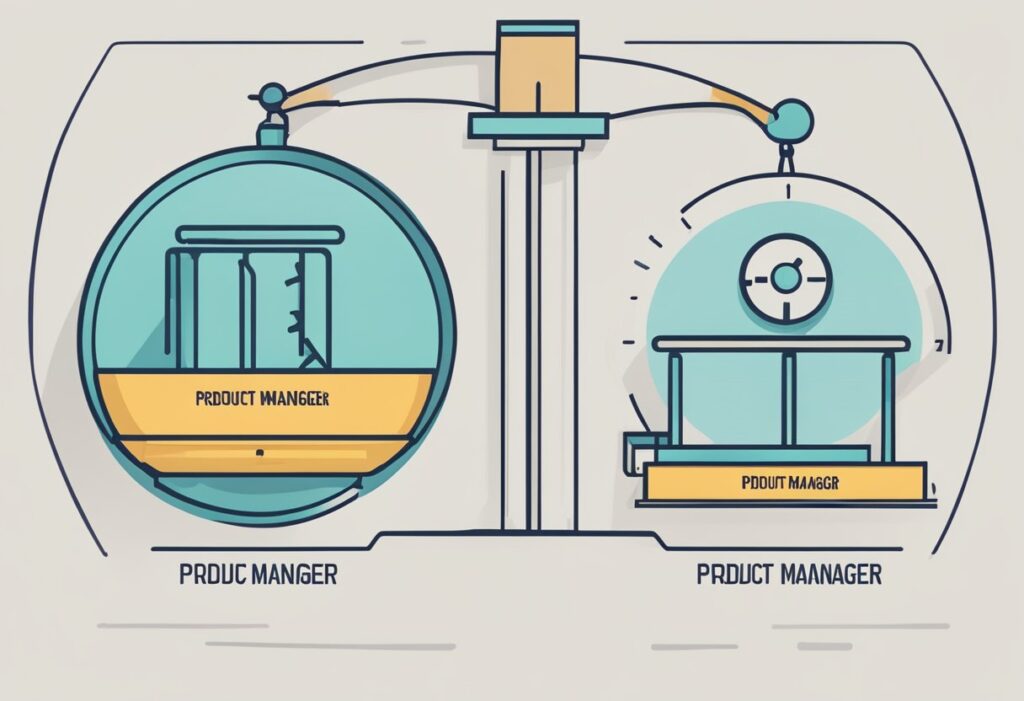When considering career paths, salary is a key factor that often tips the scales. You might be wondering how the compensation of product managers stacks up against that of engineers. Both roles are crucial in the tech industry; product managers orchestrate the development of products from idea to launch, while engineers solve complex problems to turn those ideas into reality. Deciding on a career isn’t just about passion—it’s about knowing the tangible benefits, too.

Product managers typically earn higher salaries than engineers. Their strategic role in a company’s growth and their responsibility for the product’s success contribute to their compensation packages.
As you continue reading, you’ll find insights into the factors that influence the income levels of product managers and engineers, including industry trends, geographical variations, and the impact of experience and education on earning potential. You’ll gain a comprehensive understanding of the compensation landscape for these pivotal roles in today’s technology-driven market.
Comparing Salaries in Different Markets

Navigating the complex landscape of tech salaries can be daunting, but understanding the nuances between roles and regions brings clarity. In the bustling market, you’ll see how your potential earnings can differ staggeringly depending on various factors.
Software Engineers Vs Product Managers
Product Managers often enjoy higher average base pay than Software Engineers. Research shows that Product Managers typically earn around $109,000 annually, whereas Engineers see an average of $92,000. Nevertheless, some Engineers in high-tier positions or specialized areas can surpass these figures, earning well into six figures.
Regional Variations in Salaries
Your location massively sways your salary prospects. In the United States, particularly in tech hubs like Silicon Valley, salaries are scaled to reflect the high cost of living. Conversely, an Australian Product Manager might earn an average of $118,652, with those in Canberra enjoying upwards of $263,309 according to salary data. Comparatively, the United Kingdom shows a diverse salary scale, balancing between metropolitan demand and regional cost of living differences.
Industry Demands and Salary Trends
Salary trends shift regularly with industry demands. As tech continues to evolve, salary figures showcase senior roles commanding impressive compensation, including bonuses and equity. Moreover, platforms such as Glassdoor and LinkedIn provide real-time insight, indicating the growing demand for Product Managers and the correlating lift in their compensation packages over recent years.
Skills and Experience Considerations

When evaluating compensation differences between product managers and engineers, your skills, direct experiences, and progress through seniority levels are pivotal factors.
Roles and Responsibilities
Product managers and engineers share the goal of delivering great products, but their day-to-day tasks diverge significantly. Your role as a product manager often includes defining the vision and strategy, while an engineer is more hands-on with creating the technology. A technical product manager, however, might straddle these areas more closely, requiring a blend of both management and technical acumen. The nature of your work will play into compensation.
Career Progression and Seniority
Your career ladder might look different depending on whether you’re in product management or engineering. As a software engineer, you might advance to senior engineer or engineering manager, where technical skills remain paramount. In product management, your trajectory moves through job titles like senior product manager and director of product management, with leadership and strategic analysis becoming more central. Finally, a chief product officer sits at the peak, tying directly to potential earnings.
Specialized Knowledge and Expertise
Having specialized knowledge can tilt the pay scale in your favor. If you’re a technical product manager with deep expertise in the product’s underlying technology, you might command a higher salary. For engineers, an unmatched grasp of complex systems or leading-edge programming skills can lead to premium pay. The mastery of relevant tools, along with your experience in developing successful products, directly influences your value to an organization.
Understanding Total Compensation

When unravelling the threads of total compensation, it’s pivotal to note that it isn’t just base pay that fills up your paycheck. Compensation packages encompass both tangible and intangible rewards that you might encounter in your financial journey.
Base Pay Vs Benefits
Base pay is the foundational stone of your income, the specified rate you receive for your work per annum or hour. It’s straightforward and often the figure that’s discussed first during salary negotiations. In contrast, benefits are a kaleidoscope of offerings that may include health insurance, retirement plans, and paid time off. They are supplementary to your base pay but significantly boost your total compensation.
- Base pay: Fundamental payment for your job—typically a salary or hourly wage
- Benefits: Indirect remunerations that cater to health, wellness, and long-term financial security
While your base pay is transparent, the value of benefits can fluctuate based on personal circumstances and company policies.
Bonuses and Equity
Delving deeper, bonuses are performance-driven cash gifts that can amplify your earnings; they are your rewards for reaching or exceeding targets. Equity or stock options, often a golden highlight of tech compensation, grant you ownership stakes that can potentially burgeon into a windfall, aligning your prosperity with that of the company’s.
- Bonuses: Monetary incentives reflective of individual or company success
- Equity: A share in the company that may appreciate in value over time
Your compensation package is a tapestry that includes these diverse threads. Each component contributes differently to your financial picture, and it’s wise to grasp each thread to understand the full scope of your total compensation.
The Influence of Company Size and Type

When you navigate the job market, it’s crucial to understand how company size and the type of organization impact the compensation of product managers compared to engineers.
Startups Vs Established Companies
At startups, product managers often wear many hats, leading to a broad scope of responsibilities. Your compensation in these environments might include equity options, which could significantly appreciate in value if the startup succeeds. However, the average salary might initially be lower than that of your peers at established firms. Engineers at startups also may receive a lower base pay but can negotiate for equity, reflecting the high risk-high reward nature of these ventures.
On the other hand, in established companies, salaries for product managers are usually more substantial, reflecting the greater stability and resources of these organizations. Here, engineers also benefit from more predictable salary structures, but they may find less flexibility in salary negotiation compared to smaller entities. It’s no secret that big tech firms often set compensation benchmarks within the industry.
Tech Giants and Compensation Benchmarking
Consider Google, a leading tech giant known for rewarding its talent handsomely. At such organizations, both product managers and engineers are offered competitive salaries. Product managers might command higher wages due to their strategic role and the direct impact they can have on the company’s direction and product portfolio. Big tech salaries often set industry standards, leading to upward pressure on salaries in smaller companies seeking to attract top talent.
Within these tech behemoths, corporate structure and company size play into your advantage during salary negotiations due to the extensive resources at their disposal. Engineers, while exceptionally well-paid, may find that their compensation is less influenced by strategic negotiations and more by standardized pay scales and well-defined career ladders.
Job Role Specifics and Valuation

Understanding the discrete responsibilities and business impact of product managers, product owners, and engineers is crucial when considering their compensation.
Product Manager Vs Product Owner Vs Engineer
Product managers (PMs) are the visionaries who define the product strategy and ensure that customer needs align with business objectives. Their focus is broad, involving market research and defining a product’s overall direction to achieve product-market fit.
In contrast, product owners dive deeply into the specifics, bridging gaps between customer feedback and technical teams. Your product owner translates the manager’s strategic vision into actionable tasks, making sure that features are prioritized effectively in the product backlog.
Software engineers, the builders, translate requirements and designs into functional software. They handle the technical side, solving problems and creating the products. With a hands-on approach, engineers focus on delivering quality code and innovative solutions within various constraints.
Role Impact on Business Success
Each role is pivotal in its own right. The success or failure of a product often hinges on how well these roles are executed and integrated. PMs devise the business case and guide the product down a path that’s anticipated to generate the most value. Your product manager’s leadership in identifying a winning product can lead to swings in the company’s fortunes.
A product owner’s contribution lies in maintaining the backlog and ensuring that every sprint is a step towards fulfilling those high-level goals set by PMs. They’re charged with the crucial task of balancing the team’s workflow and customer needs.
Software engineers, meanwhile, have a direct impact on business success by building the product itself. A skilled engineer who excels at creating robust, efficient systems can propel a company forward by ensuring superior product performance and reliability.
